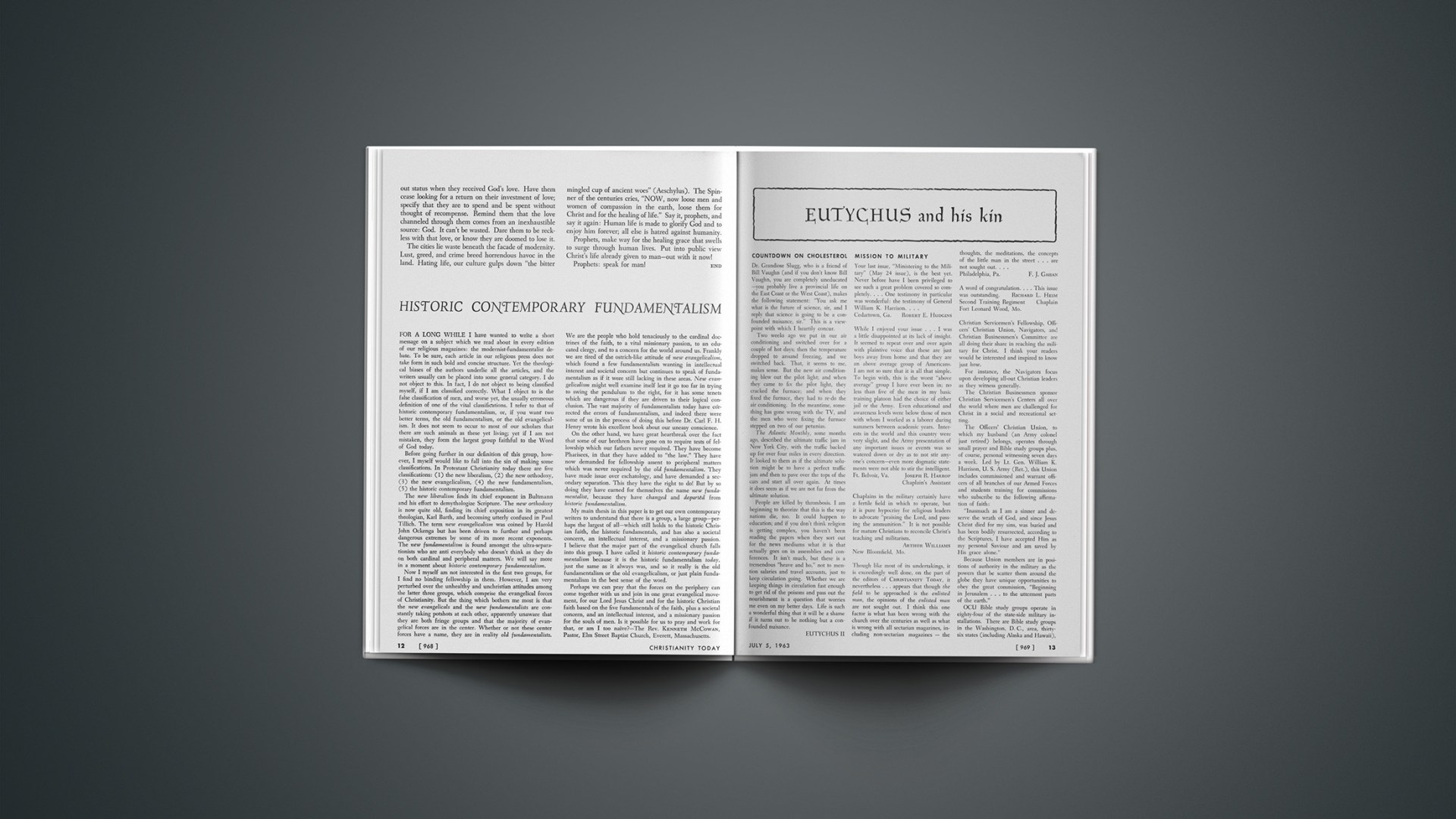For a long while I have wanted to write a short message on a subject which we read about in every edition of our religious magazines: the modernist-fundamentalist debate. To be sure, each article in our religious press does not take form in such bold and concise structure. Yet the theological biases of the authors underlie all the articles, and the writers usually can be placed into some general category. I do not object to this. In fact, I do not object to being classified myself, if I am classified correctly. What I object to is the false classification of men, and worse yet, the usually erroneous definition of one of the vital classifications. I refer to that of historic contemporary fundamentalism, or, if you want two better terms, the old fundamentalism, or the old evangelical ism. It does not seem to occur to most of our scholars that there are such animals as these yet living; yet if I am not mistaken, they form the largest group faithful to the Word of God today.
Before going further in our definition of this group, however, I myself would like to fall into the sin of making some classifications. In Protestant Christianity today there are five classifications: (1) the new liberalism, (2) the new orthodoxy, (3) the new evangelicalism, (4) the new fundamentalism, (5) the historic contemporary fundamentalism.
The new liberalism finds its chief exponent in Bultmann and his effort to demythologize Scripture. The new orthodoxy is now quite old, finding its chief exposition in its greatest theologian, Karl Barth, and becoming utterly confused in Paul Tillich. The term new evangelicalism was coined by Harold John Ockenga but has been driven to further and perhaps dangerous extremes by some of its more recent exponents. The new fundamentalism is found amongst the ultra-separationists who are anti everybody who doesn’t think as they do on both cardinal and peripheral matters. We will say more in a moment about historic contemporary fundamentalism.
Now I myself am not interested in the first two groups, for I find no binding fellowship in them. However, I am very perturbed over the unhealthy and unchristian attitudes among the latter three groups, which comprise the evangelical forces of Christianity. But the thing which bothers me most is that the new evangelicals and the new fundamentalists are constantly taking potshots at each other, apparently unaware that they are both fringe groups and that the majority of evangelical forces are in the center. Whether or not these center forces have a name, they are in reality old fundamentalists. We are the people who hold tenaciously to the cardinal doctrines of the faith, to a vital missionary passion, to an educated clergy, and to a concern for the world around us. Frankly we are tired of the ostrich-like attitude of new evangelicalism, which found a few fundamentalists wanting in intellectual interest and societal concern but continues to speak of fundamentalism as if it were still lacking in these areas. New evangelicalism might well examine itself lest it go too far in trying to swing the pendulum to the right, for it has some tenets which are dangerous if they are driven to their logical conclusion. The vast majority of fundamentalists today have corrected the errors of fundamentalism, and indeed there were some of us in the process of doing this before Dr. Carl F. H. Henry wrote his excellent book about our uneasy conscience.
On the other hand, we have great heartbreak over the fact that some of our brethren have gone on to require tests of fellowship which our fathers never required. They have become Pharisees, in that they have added to “the law.” They have now demanded for fellowship assent to peripheral matters which was never required by the old fundamentalism. They have made issue over eschatology, and have demanded a secondary separation. This they have the right to do! But by so doing they have earned for themselves the name new fundamentalist, because they have changed and departed from historic fundamentalism.
My main thesis in this paper is to get our own contemporary writers to understand that there is a group, a large group—perhaps the largest of all—which still holds to the historic Chrisian faith, the historic fundamentals, and has also a societal concern, an intellectual interest, and a missionary passion. I believe that the major part of the evangelical church falls into this group. I have called it historic contemporary fundamentalism because it is the historic fundamentalism today, just the same as it always was, and so it really is the old fundamentalism or the old evangelicalism, or just plain fundamentalism in the best sense of the word.
Perhaps we can pray that the forces on the periphery can come together with us and join in one great evangelical movement, for our Lord Jesus Christ and for the historic Christian faith based on the five fundamentals of the faith, plus a societal concern, and an intellectual interest, and a missionary passion for the souls of men. Is it possible for us to pray and work for that, or am I too naive?—The Rev. KENNETH MCCOWAN, Pastor, Elm Street Baptist Church, Everett, Massachusetts.










